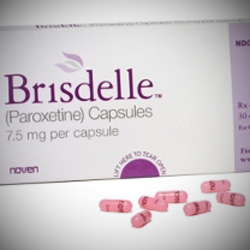By Kelly Patricia O’Meara
August 20, 2013
While the Food and Drug Administration, FDA, often makes poor decisions about drug approvals, the federal agency’s recent stamp of approval of Brisdelle (Paroxetine, which is the generic name for Paxil) to “treat” naturally-occurring hot flashes and night sweats in middle-aged women is not only misleading, but possibly life-threatening.
The FDA reports that the “non-hormonal treatment” contains the selective serotonin reuptake inhibitor (SSRI) Paroxetine Mesylate (Paxil) and the “mechanism by which Brisdelle reduces hot flashes is unknown.”
Great. The FDA approves another drug “treatment” that it has no idea how it works, but at least it is consistent, as the FDA also does not know the “mechanism by which Paxil (Paroxetine) works.”
Although the FDA may not know how Paroxetine works, it is well aware of the dangers associated with the psychiatric drug. In fact, when one considers all of the FDA and international warnings associated with Paroxetine, one has to wonder what these people are thinking, or if they are thinking.
Paroxetine isn’t some benign, harmless drug, it is a very strong psychiatric mind-altering drug that carries the FDA’s most serious Black Box Warning because of the drug’s related risk for suicidal thinking and behavior.
Add to the FDA’s Black Box Warning for suicidal thinking/behavior the other 41 drug regulatory agency warnings from the United Kingdom, Canada, Japan, Australia, New Zealand and Germany and suddenly the potential for harm caused by this psychiatric pill becomes much more clear. In fact, there are nearly two dozen drug regulatory warnings on Paroxetine causing suicidal thoughts and behavior, alone.
 Paroxetine was first approved by the FDA in 1992 as the antidepressant, Paxil, produced by the pharmaceutical giant, GlaxoSmithKline. Within a decade, the link between Paxil (Paroxetine) and severe side effects began to accumulate and the lawsuits by the injured flooded the judicial system.
Paroxetine was first approved by the FDA in 1992 as the antidepressant, Paxil, produced by the pharmaceutical giant, GlaxoSmithKline. Within a decade, the link between Paxil (Paroxetine) and severe side effects began to accumulate and the lawsuits by the injured flooded the judicial system.
While never admitting wrong-doing, GlaxoSmithKline has settled numerous cases amounting to billions-of-dollars, including $3 billion to settle a Department of Justice investigation into the marketing of Paxil and $1 billion to settle more than 800 lawsuits with the average recovery of $1.2 million. More specifically, 450 lawsuits related to suicide already have been settled for more than $390 million.
The FDA’s approval of Brisdelle (Paroxetine) for hot flashes is not good news for women, who currently are the most drugged people in America. That’s right, while one in 10 Americans take at least one antidepressant, for women in their 40’s and 50’s (menopausal) the figure is one in four.
Ironically, among the many adverse side effects associated with Paroxetine are sweating and trouble sleeping (insomnia) – the very symptoms associated with menopause! This is no joke.
The FDA has approved a drug specifically for middle-aged women that is known to cause the very symptoms it is reported to alleviate. Worse still, one only need review the list of side effects of the newly approved Brisdelle (Paroxetine) against those associated with Paxil (Paroxetine) to see that they are identical. In other words, it doesn’t matter what you call the “new” drug, it still is Paroxetine.
And, to add insult to injury, if one reviews the side effects of all of the SSRI antidepressants on the market, one cannot help but notice that all of these psychiatric drugs can cause sweating and insomnia.
After considering that antidepressants cause sweating/insomnia and that menopausal women already are the biggest users of antidepressants, is it wrong to question whether the psychiatric drug could be responsible for, or at least add to, the reported menopausal symptoms? The clinical trial data is not made public so there is no way of knowing how many of the participants already were taking psychiatric drugs.
What is clear is that if there is a spike in suicides/suicidal behavior among the drug’s targeted age group—menopausal women—the blame will be placed squarely on menopausal symptoms, not the psychiatric drug.
It will be just like the people who experienced suicidal thoughts while being “treated” with antidepressants for their depression. It was the depression, not the drugs that caused them to commit suicide. You can hear it, can’t you? “Well, she was going through menopause.”
—
Kelly Patricia O’Meara is an award-winning former investigative reporter for the Washington Times, Insight Magazine, penning dozens of articles exposing the fraud of psychiatric diagnosis and the dangers of the psychiatric drugs—including her ground-breaking 1999 cover story, Guns & Doses, exposing the link between psychiatric drugs and acts of senseless violence. She is also the author of the highly acclaimed book, Psyched Out: How Psychiatry Sells Mental Illness and Pushes Pills that Kill. Prior to working as an investigative journalist, O’Meara spent sixteen years on Capitol Hill as a congressional staffer to four Members of Congress. She holds a B.S. in Political Science from the University of Maryland.


